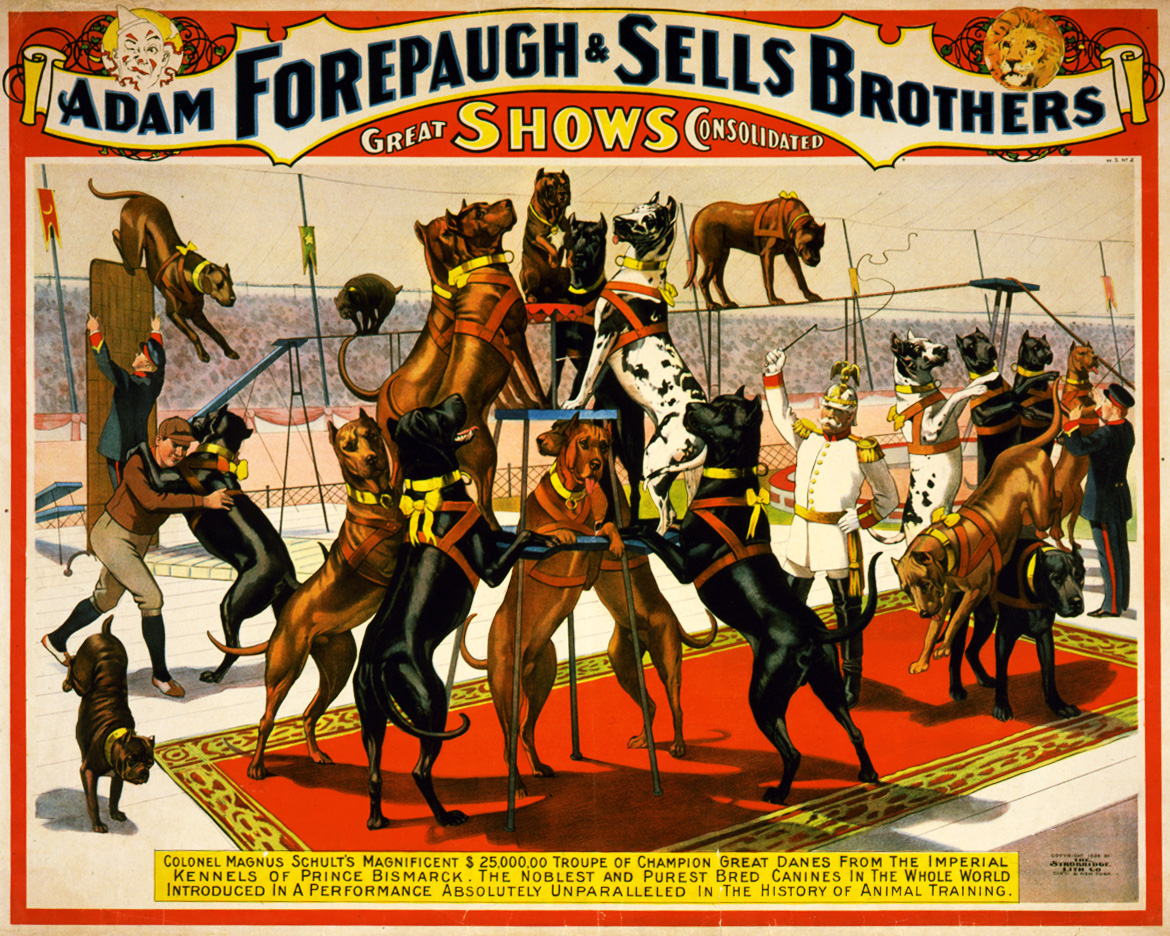|
The Rising Of The Moon (novel)
''The Rising of the Moon'' is a 1945 mystery detective novel by the British writer Gladys Mitchell. It is the eighteenth in her long-running series featuring the psychoanalyst and amateur detective Mrs Bradley. It has been described as one of the best of Mitchell's novels.Hanson p.176 In 2000 it was adapted for an episode of the television series '' The Mrs Bradley Mysteries'' starring Diana Rigg. Synopsis The arrival of a travelling circus enlivens the life of a sleepy English village, particularly when one of the female tightrope walkers is found dead. The killing of a second victim, a barmaid A bartender (also known as a barkeep, barman, barmaid, or a mixologist) is a person who formulates and serves alcoholic or soft drink beverages behind the bar, usually in a licensed establishment as well as in restaurants and nightclubs, but a ..., again when the moon is shining brightly suggests that there may be a lunatic at large. References Bibliography * Hanson, Gillia ... [...More Info...] [...Related Items...] OR: [Wikipedia] [Google] [Baidu] |
Gladys Mitchell
Gladys Maude Winifred Mitchell (21 April 1901 – 27 July 1983) was an English writer best known for her creation of Mrs Bradley, the heroine of 66 detective novels. She also wrote under the pseudonyms Stephen Hockaby and Malcolm Torrie. Fêted during her life (called "the Great Gladys" by Philip Larkin), her work has been largely neglected in the decades since her death. Life Gladys Maude Winifred Mitchell was born in Cowley, Oxford on 19 April 1901 to James, a market gardener of Scottish parentage, and Annie. She was educated at Rothschild School, Brentford and The Green School. From 1919 to 1921 she attended Goldsmiths College and University College London. Upon her graduation, Mitchell became a teacher of history, English and games at St Paul's School, Brentford until 1925. She then taught at St Ann's Senior Girls School, Hanwell until 1939. In 1926 she obtained an external diploma in European History from University College, and she then began to write novels w ... [...More Info...] [...Related Items...] OR: [Wikipedia] [Google] [Baidu] |
Tightrope Walker
Tightrope walking, also called funambulism, is the skill of walking along a thin wire or rope. It has a long tradition in various countries and is commonly associated with the circus. Other skills similar to tightrope walking include slack rope walking and slacklining. Types Tightwire is the skill of maintaining balance while walking along a tensioned wire between two points. It can be done either using a balancing tool (umbrella, fan, balance pole, etc.) or "freehand", using only one's body to maintain balance. Typically, tightwire performances either include dance or object manipulation. Object manipulation acts include a variety of props in their acts, such as clubs, rings, hats, or canes. Tightwire performers have even used wheelbarrows with passengers, ladders, and animals in their act. The technique to maintain balance is to keep the performer's centre of mass above their support point—usually their feet. Highwire is a form of tightwire walking but performed at much ... [...More Info...] [...Related Items...] OR: [Wikipedia] [Google] [Baidu] |
British Detective Novels
British may refer to: Peoples, culture, and language * British people, nationals or natives of the United Kingdom, British Overseas Territories, and Crown Dependencies. ** Britishness, the British identity and common culture * British English, the English language as spoken and written in the United Kingdom or, more broadly, throughout the British Isles * Celtic Britons, an ancient ethno-linguistic group * Brittonic languages, a branch of the Insular Celtic language family (formerly called British) ** Common Brittonic, an ancient language Other uses *''Brit(ish)'', a 2018 memoir by Afua Hirsch *People or things associated with: ** Great Britain, an island ** United Kingdom, a sovereign state ** Kingdom of Great Britain (1707–1800) ** United Kingdom of Great Britain and Ireland (1801–1922) See also * Terminology of the British Isles * Alternative names for the British * English (other) * Britannic (other) * British Isles * Brit (other) * Briton (d ... [...More Info...] [...Related Items...] OR: [Wikipedia] [Google] [Baidu] |
Novels Set In England
A novel is a relatively long work of narrative fiction, typically written in prose and published as a book. The present English word for a long work of prose fiction derives from the for "new", "news", or "short story of something new", itself from the la, novella, a singular noun use of the neuter plural of ''novellus'', diminutive of ''novus'', meaning "new". Some novelists, including Nathaniel Hawthorne, Herman Melville, Ann Radcliffe, John Cowper Powys, preferred the term "romance" to describe their novels. According to Margaret Doody, the novel has "a continuous and comprehensive history of about two thousand years", with its origins in the Ancient Greek and Roman novel, in Chivalric romance, and in the tradition of the Italian renaissance novella.Margaret Anne Doody''The True Story of the Novel'' New Brunswick, NJ: Rutgers University Press, 1996, rept. 1997, p. 1. Retrieved 25 April 2014. The ancient romance form was revived by Romanticism, especially the hist ... [...More Info...] [...Related Items...] OR: [Wikipedia] [Google] [Baidu] |
British Thriller Novels
British may refer to: Peoples, culture, and language * British people, nationals or natives of the United Kingdom, British Overseas Territories, and Crown Dependencies. ** Britishness, the British identity and common culture * British English, the English language as spoken and written in the United Kingdom or, more broadly, throughout the British Isles * Celtic Britons, an ancient ethno-linguistic group * Brittonic languages, a branch of the Insular Celtic language family (formerly called British) ** Common Brittonic, an ancient language Other uses *'' Brit(ish)'', a 2018 memoir by Afua Hirsch *People or things associated with: ** Great Britain, an island ** United Kingdom, a sovereign state ** Kingdom of Great Britain (1707–1800) ** United Kingdom of Great Britain and Ireland (1801–1922) See also * Terminology of the British Isles * Alternative names for the British * English (other) * Britannic (other) * British Isles * Brit (other) * Brito ... [...More Info...] [...Related Items...] OR: [Wikipedia] [Google] [Baidu] |
Novels By Gladys Mitchell
A novel is a relatively long work of narrative fiction, typically written in prose and published as a book. The present English word for a long work of prose fiction derives from the for "new", "news", or "short story of something new", itself from the la, novella, a singular noun use of the neuter plural of ''novellus'', diminutive of ''novus'', meaning "new". Some novelists, including Nathaniel Hawthorne, Herman Melville, Ann Radcliffe, John Cowper Powys, preferred the term "romance" to describe their novels. According to Margaret Doody, the novel has "a continuous and comprehensive history of about two thousand years", with its origins in the Ancient Greek and Roman novel, in Chivalric romance, and in the tradition of the Italian renaissance novella.Margaret Anne Doody''The True Story of the Novel'' New Brunswick, NJ: Rutgers University Press, 1996, rept. 1997, p. 1. Retrieved 25 April 2014. The ancient romance form was revived by Romanticism, especially the histori ... [...More Info...] [...Related Items...] OR: [Wikipedia] [Google] [Baidu] |
1945 British Novels
1945 marked the end of World War II and the fall of Nazi Germany and the Empire of Japan. It is also the only year in which nuclear weapons have been used in combat. Events Below, the events of World War II have the "WWII" prefix. January * January 1 – WWII: ** Germany begins Operation Bodenplatte, an attempt by the ''Luftwaffe'' to cripple Allied air forces in the Low Countries. ** Chenogne massacre: German prisoners are allegedly killed by American forces near the village of Chenogne, Belgium. * January 6 – WWII: A German offensive recaptures Esztergom, Hungary from the Russians. * January 12 – WWII: The Soviet Union begins the Vistula–Oder Offensive in Eastern Europe, against the German Army. * January 13 – WWII: The Soviet Union begins the East Prussian Offensive, to eliminate German forces in East Prussia. * January 16 – WWII: Adolf Hitler takes residence in the '' Führerbunker'' in Berlin. * January 17 ** WWII: The Soviet Union occupies Wa ... [...More Info...] [...Related Items...] OR: [Wikipedia] [Google] [Baidu] |
Moon
The Moon is Earth's only natural satellite. It is the fifth largest satellite in the Solar System and the largest and most massive relative to its parent planet, with a diameter about one-quarter that of Earth (comparable to the width of Australia). The Moon is a planetary-mass object with a differentiated rocky body, making it a satellite planet under the geophysical definitions of the term and larger than all known dwarf planets of the Solar System. It lacks any significant atmosphere, hydrosphere, or magnetic field. Its surface gravity is about one-sixth of Earth's at , with Jupiter's moon Io being the only satellite in the Solar System known to have a higher surface gravity and density. The Moon orbits Earth at an average distance of , or about 30 times Earth's diameter. Its gravitational influence is the main driver of Earth's tides and very slowly lengthens Earth's day. The Moon's orbit around Earth has a sidereal period of 27.3 days. During each s ... [...More Info...] [...Related Items...] OR: [Wikipedia] [Google] [Baidu] |
Barmaid
A bartender (also known as a barkeep, barman, barmaid, or a mixologist) is a person who formulates and serves alcoholic or soft drink beverages behind the bar, usually in a licensed establishment as well as in restaurants and nightclubs, but also occasionally at private parties. Bartenders also usually maintain the supplies and inventory for the bar. As well as serving beer and wine, a bartender can generally also mix classic cocktails such as a Cosmopolitan, Manhattan, Old Fashioned, and Mojito. Bartenders are also responsible for confirming that customers meet the legal drinking age requirements before serving them alcoholic beverages. In certain countries, such as the United States, Canada, the United Kingdom, Republic of Ireland and Sweden, bartenders are legally required to refuse more alcohol to drunk customers. History Historically, bartending was a profession with a low reputation. It was perceived through the lens of ethical issues and various legal constraints re ... [...More Info...] [...Related Items...] OR: [Wikipedia] [Google] [Baidu] |
Travelling Circus
A circus is a company of performers who put on diverse entertainment shows that may include clowns, acrobats, trained animals, trapeze acts, musicians, dancers, hoopers, tightrope walkers, jugglers, magicians, ventriloquists, and unicyclists as well as other object manipulation and stunt-oriented artists. The term ''circus'' also describes the performance which has followed various formats through its 250-year modern history. Although not the inventor of the medium, Philip Astley is credited as the father of the modern circus. In 1768, Astley, a skilled equestrian, began performing exhibitions of trick horse riding in an open field called Ha'Penny Hatch on the south side of the Thames River, England. In 1770, he hired acrobats, tightrope walkers, jugglers and a clown to fill in the pauses between the equestrian demonstrations and thus chanced on the format which was later named a "circus". Performances developed significantly over the next fifty years, with large-scale ... [...More Info...] [...Related Items...] OR: [Wikipedia] [Google] [Baidu] |





